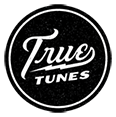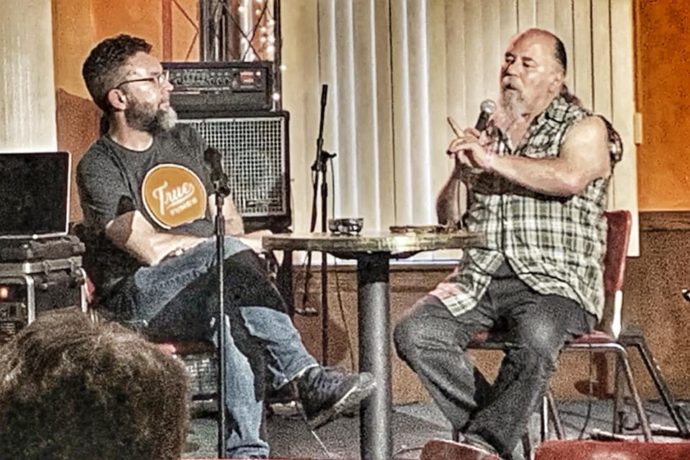Jesus, Bread and Chocolate; A Personal Appreciation by Doug Van Pelt
(Obviously I can’t review my own book, so I was thrilled when my long-time friend Doug Van Pelt of HM Magazine fame asked if he could send me a guest blog post. I wouldn’t call it a review, per se, but more of an “appreciation.” Whatever you call it, I sure appreciate it.)
I am so glad this great idea for a book has now reached fruition. Every time I’d sit down with John over the past few years to talk it, its major points resonated within me. I knew it was an idea that had staying power, but this book couldn’t have come out fast enough. The culture around us is ripe for its message. So here are some random (but hopefully not too painfully disorganized) thoughts on Jesus, Bread, and Chocolate.
John and I have been friends and peers in this crazy, faith-based music industry that moved from its infancy when we started out in the mid-80s, to its zenith in just a couple of short decades. Now we’re like old rock & roll veterans in a music world that’s very dynamic, quick to forget, yet still thriving at its authentic roots on stages in dark, dirty bars.
I find it ironic that, after leaving my faith-based rock publication behind (HM Magazine, which John worked for during a short run of three or so years), that I now work for the Texas Department of Agriculture, of all places. I’ve somehow found my way back to the Garden. I’m not exactly outdoors getting dirty, but I am thankful that I’m still working in an environment that’s bigger than me and my Texas-sized ego. The marketing program that I’m part of here is called GO TEXAN and it’s huge. It promotes the products, culture and communities that call Texas home. In other words, it has planted the Texas flag right in the middle of this trending soil called “Go Local.” People all over the world are realizing that community, identity and authenticity are found right around them in the place they call home. Food tastes better when it hasn’t been trucked thousands of miles to get to your plate. Who knew I’d be working in the same kind of environment that John is talking about in this brilliant book?
Even if there were no spiritual connections in its premise, this book is important. It captures the spark of an idea that is contagious and alive. There is a revolution at hand. The rise of the generic, bland and mass-produced has hopefully also reached its peak and will move ever so slightly in a downward direction from here on out. There’s a problem in our culture and this book has its finger on the pulse. The cause of this national and even worldwide problem has never really been exposed, to my mind, until now. Jesus, Bread and Chocolate is more than just a cute little study of the artisan crafts of bread and chocolate making, coffee roasting, hand crafted music and beer brewing. It’s almost an indictment against the Industrial Revolution itself.
Almost, because it’s not really the industrial revolution and the rise of mass transportation that is to blame, of course, it’s us. All that machinery only accelerated the shallow and sinful bent of our tendencies to ruin things. But John’s isn’t a radical cry to destroy the automation and assembly lines of industrialization. It is instead simply a call to be mindful of how we live – to extract the precious from the worthless. Some things are better coming from the machine (medicine, cars, airplanes, etc.) and some things are better homegrown (bread, coffee, beer, chocolate and authentic community.)
John adroitly balances out this critique and observation with temperance and personal reflection. Like I said, he’s not calling for an overthrow or full-blown revolution. He’s just contemplating the errors and implications of the industrial revolution as it relates to heart and soul.
“The Middle Ages brought us the Crusades and the various Inquisitions,” writes Thompson. “Theological error and extremism are obviously not limited to any particular era, but the effects of the Industrial Revolution are often far less appreciated than those of earlier epochs. Perhaps that is because we are currently still trapped in their grip.” He’s teaching us a lesson that resonates because a lot of us are awakening to the realization that mass-produced and cheaper is not always better. We’ve lost something in the pursuit of more, more, more.
While I knew that this collection of stories needed to be told, I couldn’t wait to see if the overall presentation would be more powerful than the five-minute plot summaries that I’d gotten from John during any of his annual visits to my great city during the South by Southwest conference over the last several years. I’m happy to say that the stories fit together seamlessly, build on one another and collectively pack a big punch. Like a great argument, Jesus, Bread, and Chocolate traces the problem in small, specific areas and, without straining, reveals how this disconnect from our unique and collective identity leaves us yearning for a re-connect. John then lovingly points to a resolution that’s within our reach.
Woven into these modern day metaphors are numerous stories about John’s personal life. I love reading about his discovery of the four wonderful food groups (bread, coffee, chocolate and beer), but also his discovery of music and how his identity was shaped and challenged by his estranged (and quite strange) biological father. John’s always been a fine raconteur and the stories he shares here are all relevant and interesting.
I also deeply appreciate how he chronicles his personal spiritual journey. John’s a deep man of faith, mature and wise in the ways of the kingdom of God, and a funny man that I’m honored to name among my friends. His story is unique, yet I can relate. Like me, he’s seen his fair share of artists and acquaintances leave the faith, but it probably hasn’t shaken him inside. I love these two quotes from the book:
“I’ve seen, tasted, heard, smelled, felt, and experienced too many wonders to ever accept that life is an accident. But that doesn’t mean I’ve figured it all out.”
And…
“I tried to stop believing in God, but it never worked. There was just too much evidence all around me. Everywhere I looked, I saw his fingerprints. Music, art, nature, kisses, the sun and the moon — it all pointed to him.”
In fact, this whole book is full of quotes that I plan on sharing like favorite quotes from a movie. Watch my twitter account for evidence (twitter.com/dooglar).
Here’s another:
“Beer, chocolate, bread, sex — it can all be a source of great God-given joy and pleasure and comfort or of personal destruction. When the pleasure blessings of God are disconnected from their source and purpose, they can become sources of bondage, pain and death. There is no good thing aside from Jesus that sin can’t twist into a pair of handcuffs.”
Due to the controversy and scandalous nature of alcohol within the giant community that we call evangelicalism, I think it is very important that John had an experience like the one he talks about in his chapter, Civilization Reformulation Discernment and Beer, where he was the center of a controversy over a six pack of “Near Beer” that someone placed in the cooler at his 27th birthday party. There was even a special church meeting called to address the exploding controversy that erupted. (Nod your head if you are rolling your eyes with a familiar groan; having seen or experienced something just as ridiculous as this.) This is not a joke, though. A very profound conclusion was made at that meeting and it is chronicled in this chapter. The experience gave John a well-balanced perspective to not only be biblical and truthful (that alcohol is prescribed and blessed in the Bible) but also sensitive to the real world tragedy and destruction that alcohol has brought. Well done, brother.
It’s a shame that the word “beer” is not listed in the title of this book. I can only guess that perhaps a sharper marketing mind than I decided that it would detract from sales and an audience within the Christian Booksellers Association. I understand. I spend 28 years willfully doing business within that conservative and safe environment. It’s a shame that we often shrink from controversy and divisive topics, but it’s wise to pick our fights carefully.
I few more astute observations that I’d like to quote from the book:
“Jesus first public miracle — the first sign employed to reveal His glory — was to turn plain water into rich wine for an audience that could not appreciate it. Wow!” That is profound, isn’t it?
He points out another interesting dichotomy within the topic of food:
“Bill (an organic farmer, attorney, and seminarian,) is also aware of a major disconnect between Christians who are not concerned about their food and those in the alternative food movement who are not concerned about God. He says someone once remarked that plenty of people honor creation, but don’t honor the creator; and plenty of people honor the Creator but not the creation; but we needed to model the importance of honoring both.”
This is good stuff. Here’s another great observation, coupled with a story:
“I’ve grown up in a culture that gorges when it should learn to savor.” (This statement alone could stand on its own two feet.) “I remember sitting in a McDonald’s with my buddy Rob Anstee. I suggested we say grace before we ate our big Macs. ‘I don’t know,’ Rob said, ‘I think God might say, ‘Hey, I gave you perfectly good food and you did that to it! Don’t ask me to bless that mess. This is on you.’ So, instead of saying grace we prayed for forgiveness.”
Isn’t that hilarious?
Here’s a quote from John’s chapter, Artisanal Music and the Tune of Community:
“’You know, John,’ Russ the therapist said as I looked back at him blankly, ‘The downside to getting to do what you love for a living is that if it goes south, you have nowhere to turn for release.” This was during a time of turmoil for John as his True Tunes venue, retail store and magazine were seemingly being wrested from his control.
Dang! How come I didn’t have a counselor when I was going through the downside of my ministry and business? I could have used that kind of wisdom when I was staring at the potential end of HM Magazine as I knew it? I’m glad for John, but reading that gave me a twinge of jealousy.
I love it when he gets downright preachy. I want to stand up while I’m reading and shout, “Preach it! Bring it!” I also love a nice turn on words when I see it, like when he talks about Jesus:
“Who even allowed himself to be swallowed by the grave so he could defeat death from the inside out… and we have turned him into a candy bar in a vending machine. We act as if Jesus wants to be an accessory in our life, like our favorite T-shirt. We put him on and talk about what we believe and then go back to the feeding trough of false religion and idolatry. He called himself the bread of life and said his body is good food and his blood is good drink. We nod and choke down Twinkies.”
I love it! This isn’t the only Twinkie reference in the book. Listen to this confession (and accusation against many of our modern faith practices):
“Christians, especially evangelicals like me, often like to pulverize the gospel into small, fine, easy-to-digest particles. But if our creed can fit on a bumper sticker, we’re doing it wrong. I believe this is a by-product of our well-intentioned and laudable desire to be understandable and relevant to our peers. In the process, however, we risk turning the Bread of Life into a Twinkie. At some point, the essence of the thing we are trying to sweeten is compromised beyond usability. This processed, refined gospel feels good going down and gives us a sugar rush of emotional energy, but when the buzz wears off, we are left with nothing but a headache. No white bread gospel can satisfy the deep hunger of the human heart.”
If I were forced to reduce this book into simple sound bytes, I’d at least use that one. But, like I said before, this book is full of great, quotable quotes.
Bravo, John! I’m so glad you kept your hands to the plow and persevered. I want to give copies of Jesus, Bread and Chocolate to all my friends.




